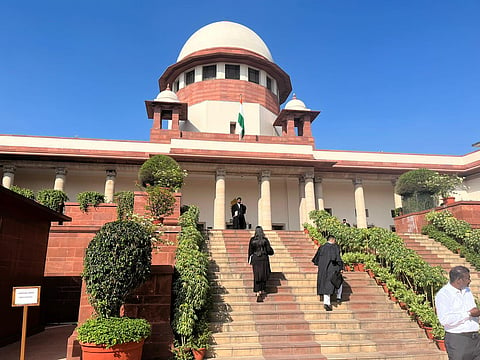

NEW DELHI: The Centre told the Supreme Court on Wednesday it was a wrong presupposition that the mere presence of someone from the judiciary in the panel for appointment of Election Commissioners and the Chief Election Commissioner would ensure transparency and independence.
A five-judge bench headed by Justice K M Joseph was told by Solicitor General Tushar Mehta, appearing for the Centre, "A presupposition that only with the presence of the judiciary, independence and fairness will be achieved, that is an incorrect reading of the Constitution. The mere presence of someone from judiciary will ensure transparency is a fallacious statement."
Mehta told the bench also comprising Justices Ajay Rastogi, Aniruddha Bose, Hrishikesh Roy and CT Ravikumar that the petitioners' proposal that a collegium-like system with the Chief Justice of India as one of the members be put in place in the absence of law for the appointment of ECs and CEC cannot be done.
"This court cannot say that in the absence of law, this should be the law because the court is dealing with the Constitution and not a statute," he said.
Justice Rastogi asks Mehta if he thinks that in the absence of law, whatever appointments are being made in a process are appropriate.
Mehta replied, "Yes, as a constitutional proposition the executive's independence and the judiciary's independence are equally sacrosanct.
The doctrine of separation of power stems from Article 14, which means all the organs of the State are equal in the eyes of the Constitution.
Justice Joseph pointed out to the Solicitor General that the Chief Justice of India is involved in the process of appointment of CBI director, then what does that mean to a democracy?
"This court has passed the judgement and it has been accepted by the executive," he said while referring to the 1997 Vineet Narain case, where the selection of CBI director was contemplated to be made by a committee.
Mehta replied that before the Vineet Narain case, the CBI director was only an officer and there was a vacuum in law as to how that person needed to be selected.
"His selection was not conferred upon the highest constitutional functionaries.
That is why this court interfered," he said, adding that the existing system of appointment of ECs and CEC is not amenable at the pre-appointment stage.
Underlining the importance of having a Chief Election Commissioner who is independent and a man of character", the top court wondered will it not be case of complete breakdown of system if the CEC does not act against the prime minister in case there are allegations against him.
The top court's remark came after the Centre claimed the present system of appointment of Election Commissioners and the Chief Election Commissioner on the basis of seniority has been doing fairly well.
The appointment of Election Commissioner Arun Goel also came under scrutiny by the top court which sought from the Centre the original records pertaining to his appointment for perusal, saying it wanted to know whether there was any "hanky-panky".
During the day-long hearing, the bench said the inclusion of the Chief Justice of India in the consultative process for the appointment of Chief Election Commissioner would ensure independence of the poll panel.
The apex court was of the view that any ruling party at the Centre "likes to perpetuate itself in power'' and can appoint a 'Yes Man' to the post under the current system.
The court was hearing a batch of pleas seeking a collegium-like system for the appointment of Election Commissioners (ECs) and the Chief Election Commissioner (CEC).
The Centre argued that a 1991 Act ensured the Election Commission remains independent in terms of salary and tenure to its members and there is no "trigger point'' which warrants interference from the court.
It said that the mechanism adopted for appointment of the Chief Election Commissioner is seniority among the election commissioners, who are appointed by convention from secretary or chief secretary level officers of the Centre and state level, respectively.
The bench said the independence of the institution should be ensured at the threshold for which the appointment should be scanned at the entry level.
"Each ruling political party at the Centre likes to perpetuate itself in power.
Now, what we want to do is concentrate on the consultative process for the appointment of CEC and the inclusion of the Chief Justice of India in the process would ensure the independence of the commission," the bench said.
Attorney General R Venkataramani, also appearing for the Centre, pointed out that the Election Commission (Conditions of Service of Election Commissioners and Transaction of Business) Act, 1991 was a watershed moment that ensured independence in salary and tenure of ECs.
"The law was passed by Parliament after the report from the Dinesh Goswami committee.
So, it cannot be said that there was no application of mind.
The law provides and ensures that the commission remains independent in terms of salary and tenure of its members which are intrinsic features for the independence of an institution," he said.
The bench told Venkataramani the 1991 law only deals with terms of a service condition which is evident from its very name.
"Suppose the government appoints a 'Yes Man', who has the same philosophy and is like-minded. The law provides him all the immunity in tenure and salary, then there is no so-called independence in the institution. This is an election commission, where independence should be ensured at the threshold," the bench said.
Venktaramani said there are various facets of independence and salary and fixed tenure are some of them.
"There is no trigger point which warrants interference from the court. It is not the case that there was some vacancy and it is not being filled or there is some arbitrariness which warrants court's interference in the process," he said.